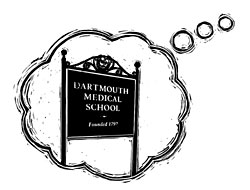For the Record
Solving problems
By Stephen P. Spielberg, M.D., Ph.D.
Conversations where everyone agrees can get pretty boring. Sometimes, creative disagreement or "dynamic tension"—when applied in a positive, problem-solving way—can foster novel solutions to long-standing problems. There are many dynamic tensions in science and medicine. But the unique strengths of Dartmouth are putting us in a true leadership position to help solve some major issues.

|
|
We are fortunate to have outstanding people thinking creatively
about these issues, from the molecular to the population level. |
In recent years, medicine has endeavored to drive decision-making with data. Much of medical care in the past was dependent on dogma—"This is the way we do things here." Typically, "here" referred to local traditions, which led to vast differences in the management of similar conditions at different institutions and across the country. Our Center for the Evaluative Clinical Sciences and The Dartmouth Atlas of Health Care have been pivotal in pointing out such differences and raising fundamental questions about optimal care. As data are derived from clinical and population-based trials, this should lead to less variability and more rational care. Practice guidelines can help improve patient outcomes, make the health-care system more efficient, and, hopefully, keep costs down.
Differences: At the same time, there have been huge advances in human pharmacogenetics/genomics. Increasingly, we recognize individual differences—in terms of both efficacy and side effects—in patients' responses to medicines. In a clinical trial, if a drug shows a 60% "success rate" and a placebo only 20%, the conclusion is that "the drug works." However, for a variety of reasons—diagnostic precision, patient compliance, and/or genetics—40% of people did not benefit from the drug. Similarly perplexing is the fact that if 1% of patients have a serious side effect, we cannot today predict beforehand who will be in that 1% and protect them. Ideally, we will someday know enough to prescribe exactly the right medicine for both efficacy and safety in each individual.
This dynamic tension between population-based guidelines and individualized therapy presents a great opportunity for developing strategies to incorporate the best of population and evaluative science with the best of "reductionist" science—that is, individual diagnostics and therapeutics. There is a great deal of dialogue about these issues, but relatively little integrative thinking. At Dartmouth, we are fortunate to have outstanding people and programs thinking creatively about them, from the molecular to the population level.
A second area of tension is how to educate medical students in the context of increasing clinical cost pressures. Academic medical centers recognize the vital importance of both education and patient care, and we struggle with assuring that our patients get the best and most efficient care possible and that our students get the best medical education possible— so they can care for tomorrow's patients. Here, too, I believe that Dartmouth has an opportunity to demonstrate national leadership.
The Association of American Medical Colleges' Council of Deans recently addressed some of these issues in a draft policy statement. That statement says that the nation's medical schools must promote "a humanistic approach to medicine; an appreciation of the importance of the biological and population sciences for the advancement of medicine; a patient-centered approach to medical care; an appreciation of the importance of fundamental research for the advancement of medical practice; an understanding of the organization, financing, and delivery of health care in the United States; a global perspective on contemporary health issues."
Statement: And, the statement goes on, we must ensure that the doctors we graduate are able to "provide culturally sensitive and appropriate care; listen and communicate effectively; weigh quality-of-life issues appropriately when making patient-care decisions; access and use available evidence effectively and efficiently when making patient- care decisions; provide care in the face of uncertainty and doubt; use resources efficiently and effectively in providing patient care; use technologies appropriately in providing patient care; participate effectively in multidisciplinary and team approaches to patient care; contribute to eliminating medical errors and improving the quality of health care; balance individual and population health needs when making patient-care decisions."
Challenges: At Dartmouth, we are well positioned to take on these challenges. Dr. Paul Batalden and others are examining ways to improve clinical teaching within DHMC, looking at factors that may improve or impede the effectiveness of teaching interactions. Dr. Patricia Carney has for several years headed a group that's collected data on student experiences and teaching outcomes throughout our system. Now Dr. David Nierenberg, senior associate dean for medical education, and others have introduced a system allowing students to electronically record their clinical experiences—so they can track their own progress and we can compare their experiences at different sites. It is a tribute to all those involved in medical student education here that DMS was one of only eight medical schools invited to submit a paper on educational research for a special upcoming issue of the journal Academic Medicine.
In dialogues about difficult matters like these, we can argue and maintain our positions steadfastly—or we can creatively address the issues, reframe the discussion, and solve problems.
At Dartmouth, our goal is always to be problem-solvers.
"For the Record" offers timely commentary from the dean of Dartmouth Medical School. Dr. Spielberg will complete his first year as dean in June of 2004.
